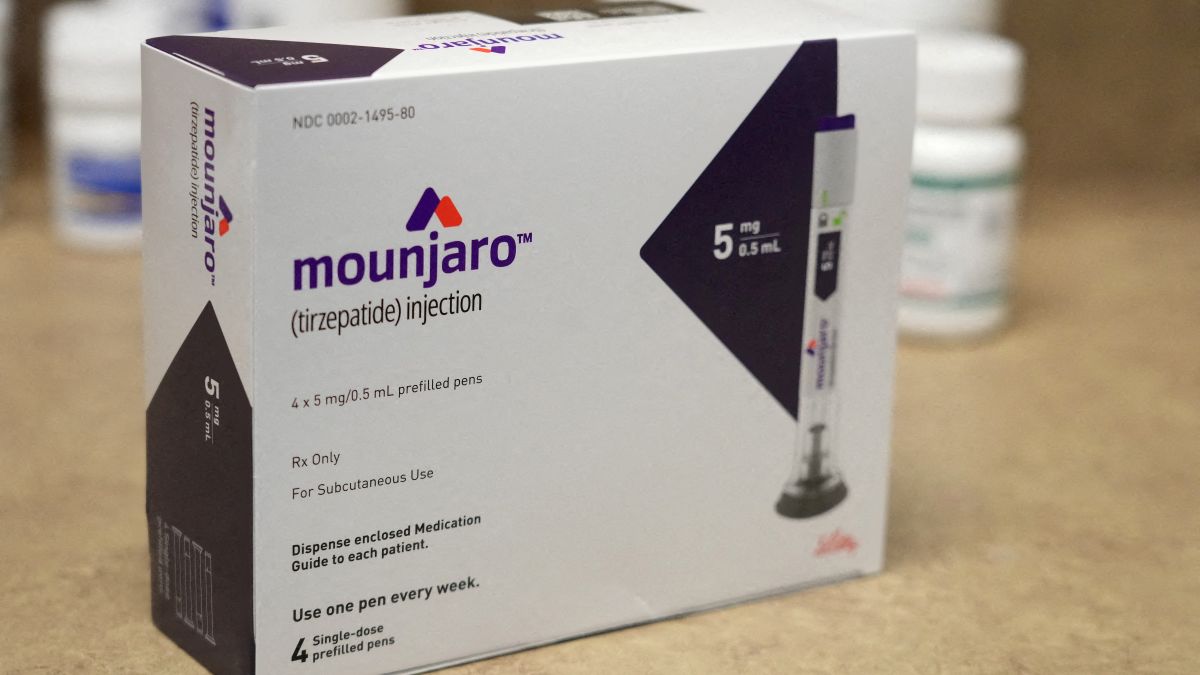The wait for India’s weight watchers is almost over. Weight loss drugs such as Ozempic, Zepbound, which have been huge hits in the American and European markets — Ozempic has been credited with boosting Denmark’s economy — will soon make its debut in the Indian markets.
Last week, the apex drug regulator’s, Central Drug Standard Control Organisation (CDSCO), subject expert committee gave the green light to Eli Lilly’s tirzepatide — the active ingredient in the company’s Mounjaro and Zepbound.
However, Elli Lilly told Economic Times: “The apex drug regulator has so far given a go-ahead for its import and marketing for diabetes and not for weight loss. The obesity indication is undergoing review by the Central Drugs Standard Control Organisation (CDSCO).”
But what is tirzepatide and how does it help in shedding kilos.
What is tirzepatide?
Tirzepatide is the main component of Eli Lilly’s drugs, Mounjaro and
Zepbound. It’s important to note here that Mounjaro is the brand name for diabetes, while Zepbound is for weight loss.
Medical experts note that tirzepatide works by mimicking two important hormones in the body: GIP and GLP-1.
When injected, it activates receptors for these hormones, triggering several effects. It stimulates the pancreas to produce more insulin, and even signals the brain to feel full. What this means is that the drug not only reduces the sugar levels in the blood but also reduces appetite, leading to weight loss in people with obesity.
Some experts note that what makes tirzepatide even more effective is that it imitates GIP, which — along with reducing appetite — may also improve how the body breaks down sugar and fat, helping to amplify the weight loss effects.
Studies show that tirzepatide is very effective in its fight against weight loss. A July 2022 study in The New England Journal of Medicine found that those taking a lower dose of tirzepatide achieved an average weight reduction of 16 per cent, or 16 kilogrammes, in about a year. Those taking a higher dose had a 21.4 per cent reduction in body weight or 22 kilogrammes.
Are there any side effects to tirzepatide?
Earlier, an Eli Lilly-funded study of tirzepatide for obesity showed that gastrointestinal issues were the most common side effects. Approximately, one-third of the people taking the highest dose of tirzepatide experienced nausea and around one-fifth experienced diarrhoea. Some participants also reported abdominal pain, vomiting, constipation, headache and dizziness.
As per the FDA, people taking Zepbound may also experience burping, hair loss and gastroesophageal reflux disease.
People who are pregnant should not take the medication. The FDA said patients should also be monitored for depression or suicidal thoughts and should stop taking if symptoms develop.
Also read: Weight-loss drugs make their way into India (illegally). Why should we be wary
How can tirzepatide be misused?
While India’s drug regulator’s SEC has given the nod for the sale of tirzepatide for type 2 diabetes, there are concerns that it will be prescribed off-label — the practice of prescribing a drug for a different purpose than what has been approved.
That’s exactly what happened in the US. In 2017, the US Food and Drugs Administration (FDA) approved Danish pharma giant Novo Nordisk’s
Ozempic, with the active ingredient semaglutide, to manage type 2 diabetes. However, doctors soon saw another side effect — weight loss. This led to a frenzy on social media as well as in the real world.
This led Novo Nordisk, in 2021, to release Wegovy, a semaglutide injection, as an FDA-approved obesity treatment.
Today, there’s a global shortage of both drugs, as the demand for them has exceeded expectations.
Also read: ‘Ozempic babies’ are on the rise: Are these weight-loss drugs boosting fertility?
When can we expect tirzepatide in the country?
Earlier this year, Eli Lilly CEO David Ricks told Reuters that Mounjaro could launch in India as early as 2025. On the other hand, Novo Nordisk plans to launch its weight-loss drug in India by 2026.
When it makes its entry in India, the drug is expected to make big gains. That’s because India has the world’s second-highest number of people with type 2
diabetes and high
obesity rates. A study in Lancet in 2023 estimated that 101 million people in India — 11.4 per cent of the country’s population — are living with diabetes.
Moreover, obesity is also on the rise in the country. As per the World Obesity Federation Atlas, around 11 per cent of Indian adults will be obese by 2034.
However, doctors note that these drugs aren’t miracle solutions for weight loss — data indicates that these drugs need to continue to be taken for their weight loss and other effects to last. For instance, a study of Wegovy reveals that those using Wegovy for 68 weeks achieved a remarkable average weight loss of 17.3 per cent. But after stopping the medication, by week 120, Wegovy users had regained most of their weight — effectively seeing an average weight loss of only 5.6 per cent.
Nevertheless, the green signal for this drug is expected to be a huge game-changer in the medical world.
With inputs from agencies

)
